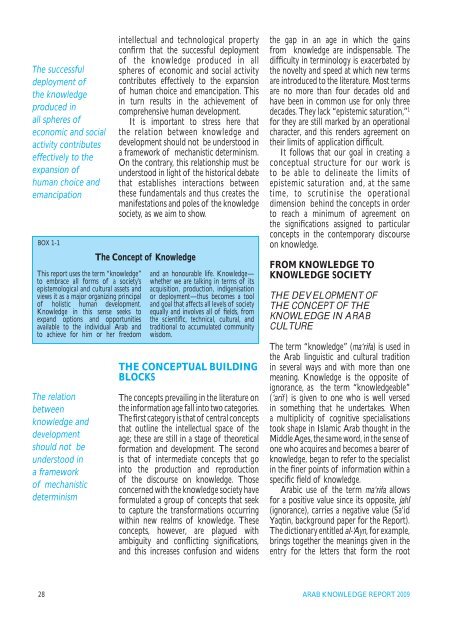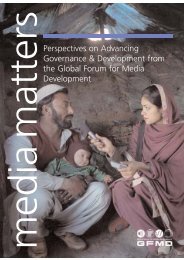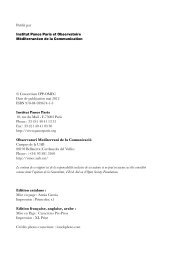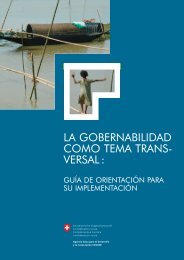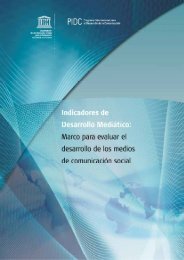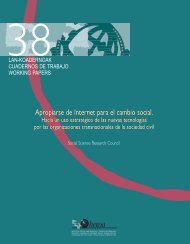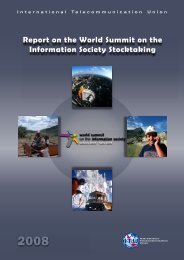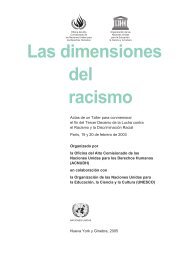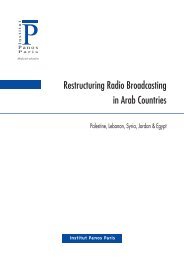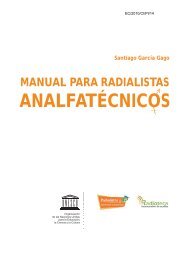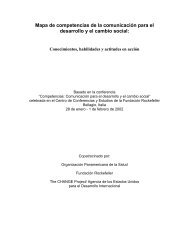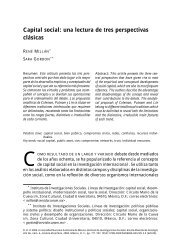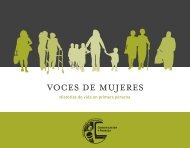Arab Knowledge Report 2009
Arab Knowledge Report 2009
Arab Knowledge Report 2009
- No tags were found...
Create successful ePaper yourself
Turn your PDF publications into a flip-book with our unique Google optimized e-Paper software.
The successfuldeployment ofthe knowledgeproduced inall spheres ofeconomic and socialactivity contributeseffectively to theexpansion ofhuman choice andemancipationBOX 1-1This report uses the term “knowledge”to embrace all forms of a society’sepistemological and cultural assets andviews it as a major organizing principalof holistic human development.<strong>Knowledge</strong> in this sense seeks toexpand options and opportunitiesavailable to the individual <strong>Arab</strong> andto achieve for him or her freedomThe relationbetweenknowledge anddevelopmentshould not beunderstood ina frameworkof mechanisticdeterminismintellectual and technological propertyconfirm that the successful deploymentof the knowledge produced in allspheres of economic and social activitycontributes effectively to the expansionof human choice and emancipation. Thisin turn results in the achievement ofcomprehensive human development.It is important to stress here thatthe relation between knowledge anddevelopment should not be understood ina framework of mechanistic determinism.On the contrary, this relationship must beunderstood in light of the historical debatethat establishes interactions betweenthese fundamentals and thus creates themanifestations and poles of the knowledgesociety, as we aim to show.The Concept of <strong>Knowledge</strong>and an honourable life. <strong>Knowledge</strong>—whether we are talking in terms of itsacquisition, production, indigenisationor deployment—thus becomes a tooland goal that affects all levels of societyequally and involves all of fields, fromthe scientific, technical, cultural, andtraditional to accumulated communitywisdom.THE CONCEPTUAL BUILDINGBLOCKSThe concepts prevailing in the literature onthe information age fall into two categories.The first category is that of central conceptsthat outline the intellectual space of theage; these are still in a stage of theoreticalformation and development. The secondis that of intermediate concepts that gointo the production and reproductionof the discourse on knowledge. Thoseconcerned with the knowledge society haveformulated a group of concepts that seekto capture the transformations occurringwithin new realms of knowledge. Theseconcepts, however, are plagued withambiguity and conflicting significations,and this increases confusion and widensthe gap in an age in which the gainsfrom knowledge are indispensable. Thedifficulty in terminology is exacerbated bythe novelty and speed at which new termsare introduced to the literature. Most termsare no more than four decades old andhave been in common use for only threedecades. They lack “epistemic saturation,” 1for they are still marked by an operationalcharacter, and this renders agreement ontheir limits of application difficult.It follows that our goal in creating aconceptual structure for our work isto be able to delineate the limits ofepistemic saturation and, at the sametime, to scrutinise the operationaldimension behind the concepts in orderto reach a minimum of agreement onthe significations assigned to particularconcepts in the contemporary discourseon knowledge.FROM KNOWLEDGE TOKNOWLEDGE SOCIETYTHE DEVELOPMENT OFTHE CONCEPT OF THEKNOWLEDGE IN ARABCULTUREThe term “knowledge” (ma‘rifa) is used inthe <strong>Arab</strong> linguistic and cultural traditionin several ways and with more than onemeaning. <strong>Knowledge</strong> is the opposite ofignorance, as the term “knowledgeable”(‘arif ) is given to one who is well versedin something that he undertakes. Whena multiplicity of cognitive specialisationstook shape in Islamic <strong>Arab</strong> thought in theMiddle Ages, the same word, in the sense ofone who acquires and becomes a bearer ofknowledge, began to refer to the specialistin the finer points of information within aspecific field of knowledge.<strong>Arab</strong>ic use of the term ma‘rifa allowsfor a positive value since its opposite, jahl(ignorance), carries a negative value (Sa‘idYaqtin, background paper for the <strong>Report</strong>).The dictionary entitled al-‘Ayn, for example,brings together the meanings given in theentry for the letters that form the root28 ARAB KNOWLEDGE REPORT <strong>2009</strong>


